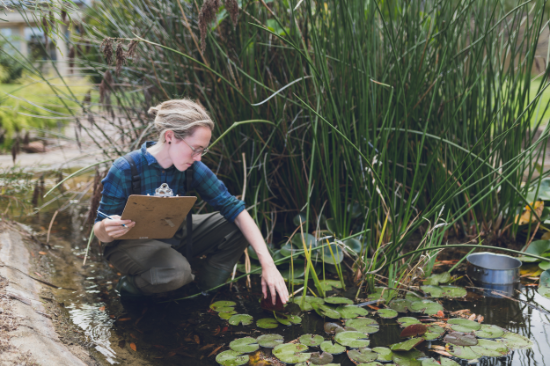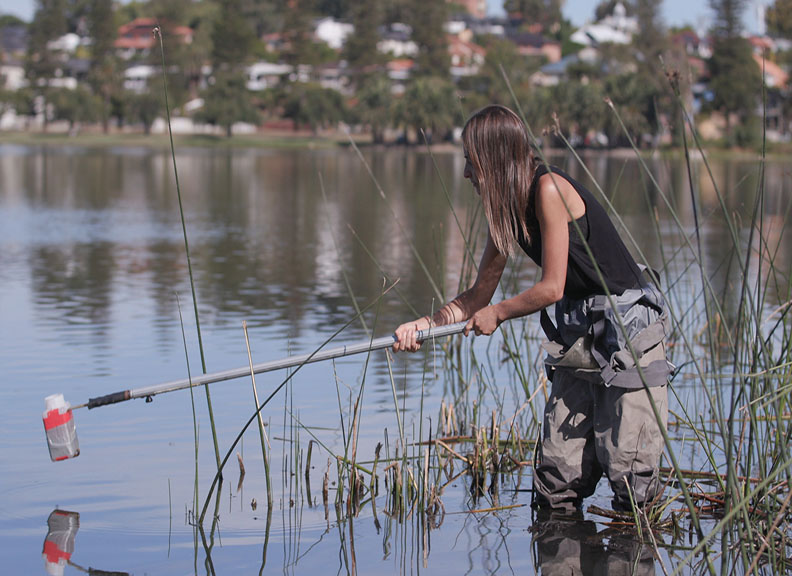Research
Environmental science
Understanding and protecting the natural world
Environmental science at UWA uses interdisciplinary research to find solutions to the challenges and pressures facing our environment, and to support sustainable development. Through teaching and research, we are developing advanced knowledge of how air, water, terrestrial and marine environmental systems respond to human impacts. Our researchers are improving environmental quality through innovative projects with practical application and are developing novel management technology.
Our work integrates an understanding of physical, chemical and biological processes within the environment, supported by state-of-the-art sensing and measurement technology. Strong links with industry and government organisations have enabled us to develop and trial solutions to issues of pollution and environmental degradation.
1st in Australia and 22nd in the world for Agricultural Sciences (ARWU 2023)
2nd in Australia and 38th in the world for Environmental Science and Engineering (ARWU 2023)
Key research areas
- Soil and land management
- Our teaching and research spans from the molecular to the landscape scale to understand how terrestrial environments respond to land management activities and climate change.
- River and estuary health
- We undertake teaching and research to understand how river and estuary health responds to altered flow regimes, and increased nutrient and contaminant loads.
- Environmental biotechnology
- Environmental biotechnology involves using the power of micro-organisms to undertake bio-treatment of polluted soil or water. By understanding how microbes process natural and manufactured materials, we are able to better design technology for treating waste and rehabilitating degraded landscapes.
- Environmental dynamics and ecohydrology
- Our teaching and research focuses on understanding the dynamic response of rivers, wetlands and forests to changes in water availability by measuring and modelling how land-surface interactions shape the function and stability of water-dependent ecosystems.
- Environmental sensing and data analytics
- Our teaching and research seeks to improve the accuracy of capability of environmental measurements, and develop advanced analysis work flows to extract important signals, patterns and trends.
Study with us
Explore your options with a range of postgraduate and research opportunities available.
Centres
We have developed close working relationships with local and national business and industry partners dedicated to furthering our environmental knowledge and conservation. Our partnerships bring together a unique combination of expertise in physical, chemical and biological aspects of the environment.- NESP Resilient Landscapes Hub
- CSIRO
- State Government of Western Australia
- ARC Centre of Excellence in Plant Energy Biology
- Centre of Excellence in Natural Resource Management
- Centre for Engineering Innovation - Agriculture and Ecological Restoration

Key Staff
- Head of School
- Department Head Environmental Science
- Academic Staff
-
- Associate Professor Bryan Boruff
- Associate Professor Deirdre Gleeson
- Associate Professor Matt Hipsey
- Associate Professor Nik Callow
- Associate Professor Parwinder Kaur
- Associate Professor Roberta Bencini
- Associate Professor Samantha Setterfield
- Associate Professor Talitha Santini
- Lecturer Sharyn Hickey
- Professor Michael Douglas
- Professor Jason Beringer
- Professor Zed Rengel
- Research Associate Alison Lullfitz
- Research Associate Sasha Jenkins
- Senior Lecturer Andrew Rate
- Senior Lecturer Matthias Leopold
- Senior Lecturer Barbara Cook
- Senior Lecturer Natasha Pauli
- Lecturer Peter Speldewinde
- Research Staff
- Emeritus, Honorary and Adjunct
-
- Senior Honorary Research Fellow Lynette Abbott
- Senior Honorary Research Fellow Robert Gilkes
- Honorary Research Fellow Suman George
- Adjunct Teaching Fellow Graeme Campbell
- Adjunct Senior Lecturer Peter Zafiropoulos
- Adjunct Research Fellow Natasha Banning
- Adjunct Research Fellow Brian Chambers
- Adjunct Research Fellow Falko Mathes
- Adjunct Research Fellow Gavan McGrath
- Adjunct Research Fellow Bede Mickan
- Adjunct Research Fellow Craig Scanlan
- Adjunct Research Fellow Dustin Severtson
- Adjunct Research Fellow Catherine Spaggiari
- Adjunct Research Fellow Ryan Tangney
- Adjunct Professor Bryson Bates
- Adjunct Professor Kevin Kenneally
- Adjunct Professor Abdul Khan
- Adjunct Professor Donald McFarlane
- Adjunct Professor Richard Silberstein
Terrestrial Ecosystem Research Networks and Observatories
Ecosystems provide us with essential services such as carbon sequestration, water, clean air and biodiversity. Crucially we need long-term ecosystem observatories to monitor the health and productivity of our key natural and managed systems. We provide intensive ecological observatories as part of a national network (Terrestrial Ecosystem Research Network and OzFlux) that improves understanding of how ecosystems (and the services they provide) respond to climate change and disturbance to provide a fundamental basis for their future management.
Our observatories are based throughout Western Australia, including:
- Litchfield
- Boyagin
- Ridgefield
- Howard
- Sturt
- Whroo
- Yanco
- Collie
- Gingin
- GWW
- Leap
- Wombat
- Howard Springs
- Riggs Creek






